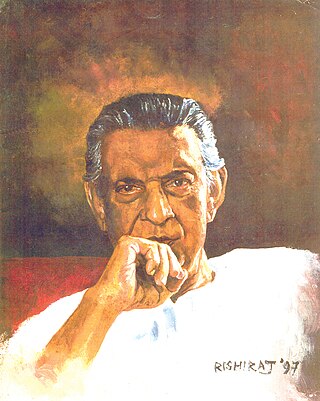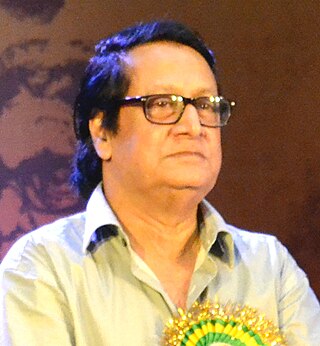Related Research Articles

Scottish Church College is a college affiliated by Calcutta University, India. It offers selective co-educational undergraduate and postgraduate studies and is the oldest continuously running Christian liberal arts and sciences college in Asia. It has been rated (A) by the Indian National Assessment and Accreditation Council. Students and alumni call themselves "Caledonians" in the name of the college festival, "Caledonia".

Shyam Benegal is an Indian film director, screenwriter and documentary filmmaker. Often regarded as the pioneer of parallel cinema, he is widely considered as one of the greatest filmmakers post 1970s. He has received several accolades, including eighteen National Film Awards, a Filmfare Award and a Nandi Award. In 2005, he was honoured with the Dadasaheb Phalke Award, India's highest award in the field of cinema. In 1976, he was honoured by the Government of India with the Padma Shri, the fourth-highest civilian honour of the country, and in 1991, he was awarded Padma Bhushan, the third-highest civilian honour for his contributions in the field of arts.

Victor Banerjee is an Indian actor who appears in English, Hindi, Bengali and Assamese language films. He has worked with great directors such as Roman Polanski, James Ivory, Sir David Lean, Jerry London, Ronald Neame, Satyajit Ray, Mrinal Sen, Shyam Benegal, Montazur Rahman Akbar and Ram Gopal Varma. He won the National Film Award for Best Supporting Actor for the film Ghare Baire. He was awarded the Padma Bhushan, India's third highest civilian award, in 2022 by the Indian Government in the field of art.

SoumitraChatterjee was an Indian film actor, play-director, playwright, writer, thespian and poet. He is regarded as one of the greatest and most influential actors in the history of Indian cinema. He is best known for his collaborations with director Satyajit Ray, with whom he worked in fourteen films.

Utpal Dutt was an Indian actor, director, and writer-playwright. He was primarily an actor in Bengali theatre, where he became a pioneering figure in Modern Indian theatre, when he founded the "Little Theatre Group" in 1949. This group enacted many English, Shakespearean and Brecht plays, in a period now known as the "Epic theatre" period, before it immersed itself completely in highly political and radical theatre. His plays became an apt vehicle for the expression of his Marxist ideologies, visible in socio-political plays such as Kallol (1965), Manusher Adhikar, Louha Manob (1964), Tiner Toloar and Maha-Bidroha. He also acted in over 100 Bengali and Hindi films in a career spanning 40 years, and remains most known for his roles in films such as Mrinal Sen’s Bhuvan Shome (1969), Satyajit Ray’s Agantuk (1991), Gautam Ghose’s Padma Nadir Majhi (1992) and Hrishikesh Mukherjee's breezy Hindi comedies such as Gol Maal (1979) and Rang Birangi (1983). He also did the role of a sculptor, Sir Digindra Narayan, in the episode Seemant Heera of Byomkesh Bakshi on Doordarshan in 1993, shortly before his death.

Madhabi Chakraborty is an Indian actress. She won the National Film Award for Best Actress for her performance in the Bengali film Dibratrir Kabya. She has acted in some of the most critically acclaimed films in Bengali cinema and is considered one of the great actresses of Bengali cinema.

Satyajit Ray was an Indian filmmaker who worked prominently in Bengali cinema and who has often been regarded as one of the greatest directors of world cinema. Ray was born in Calcutta to a Bengali family and started his career as a junior visualiser. His meeting with French film director Jean Renoir, who had come to Calcutta in 1949 to shoot his film The River (1951), and his 1950 visit to London, where he saw Vittorio De Sica's Ladri di biciclette (1948), inspired Ray to become a film-maker. Ray made his directorial debut in 1955 with Pather Panchali and directed 36 films, comprising 29 feature films, five documentaries, and two short films.

Rabindranath Tagore is a 1961 Indian documentary film written and directed by Satyajit Ray about the life and works of noted Bengali author Rabindranath Tagore. Ray started working on the documentary in early 1958. Shot in black-and-white, the finished film was released during the birth centenary year of Rabindranath Tagore, who was born on 7 May 1861. Ray avoided the controversial aspects of Tagore's life in order to make it as an official portrait of the poet. Though Tagore was known as a poet, Ray did not use any of Tagore's poetry as he was not happy with the English translation and believed that "it would not make the right impression if recited" and people would not consider Tagore "a very great poet," based on those translations. Satyajit Ray has been reported to have said about the documentary Rabindranath Tagore in his biography Satyajit Ray: The Inner Eye by W. Andrew Robinson that, "Ten or twelve minutes of it are among the most moving and powerful things that I have produced."

Sandip Ray is an Indian film director and music director who mainly works in Bengali cinema. He is the only child of the famous Indian director Satyajit Ray and Bijoya Ray.

Ranjit Mallick is an Indian actor who works mainly in Bengali cinema. Though he has starred in parallel films like Interview, Calcutta 71, Shakha Proshakha and romantic comedy like Mouchak; he is particularly known for appearing in action films such as Shatru, Guru Dakshina, Amader Songsar, Indrajit, Jibon Niye Khela, Nabab etc. In later years, he has further received praise for playing supporting roles in Sathi, Nater Guru, Gyarakal, Chander Bari and Bajimaat. He was also the Sheriff of Kolkata for the year 2014. He is one of the most anticipated actors of Bengali cinema and has been a part of more than 100 films as of now. Megastar in Bengali film industry

Satyajit Ray was an Indian director, screenwriter, documentary filmmaker, author, essayist, lyricist, magazine editor, illustrator, calligrapher, and composer. Ray is widely considered one of the greatest and most influential film directors in world cinema. He is celebrated for works including The Apu Trilogy (1955–1959), The Music Room (1958), The Big City (1963) and Charulata (1964) and the Goopy–Bagha trilogy.

Cinema of West Bengal, also known as Tollywood or Bengali cinema, is an Indian film industry of Bengali-language motion pictures. It is based in the Tollygunge region of Kolkata, West Bengal, India. The origins of the nickname Tollywood, a portmanteau of the words Tollygunge and Hollywood, dates back to 1932. It was a historically important film industry, at one time the centre of Indian film production. The Bengali film industry is known for producing many of Indian cinema's most critically acclaimed global Parallel Cinema and art films, with several of its filmmakers gaining prominence at the Indian National Film Awards as well as international acclaim.
Haradhan Bandopadhyay was a Bengali Indian actor of television and films. He made his debut in the 1948 Bengali film Devdut, directed by Atanu Bandopadhyay. He worked with some of the most prominent directors of Bengali cinema, like Satyajit Ray and Mrinal Sen.
Narayanswamy Viswanathan, popularly known as Calcutta Viswanathan in the Tamil film industry, was an Indian actor and academic. A Tamil by birth, he moved to Calcutta at a young age and taught English at St. Xavier's College, Calcutta for more than 40 years. Viswanathan was also a well-known public speaker. He made his acting debut in Mrinal Sen's Punascha and continued to act in Bengali films. In a career that spanned 40 years, Viswanathan appeared in nearly 100 films in Bengali, Tamil and English. He was a member several theatre groups and also formed the "Calcutta Players", an acting troupe.

Manoj Mitra is an Indian theatre, film and television actor, director and playwright.

Buddhadeb Dasgupta was an Indian filmmaker and poet best known for his Bengali-language films like Bagh Bahadur, Tahader Katha, Charachar and Uttara. Five of his films have won the National Film Award for Best Feature Film, Bagh Bahadur (1989), Charachar (1993), Lal Darja (1997), Mondo Meyer Upakhyan (2002) and Kaalpurush (2008), while Dooratwa (1978) and Tahader Katha (1993) have won the National Film Award for Best Feature Film in Bengali. As a director, he has won National Film Award for Best Direction twice, for Uttara (2000) and Swapner Din (2005). Over the years he has published several works of poetry including Govir Araley, Coffin Kimba Suitcase, Himjog, Chhaata Kahini, Roboter Gaan, Sreshtha Kabita, and Bhomboler Ascharya Kahini O Ananya Kabita.

Satarupa Sanyal is a Bengali Indian independent or parallel cinema film director, producer, actress, poet and social activist, based in Kolkata, India.

Chokh is a 1983 Indian Bengali film directed by Utpalendu Chakrabarty, with Om Puri, Anil Chatterjee, Shyamanand Jalan and Sreela Majumdar in lead roles. The film is set in 1975 and the oppression and exploitation of Jute mill workers in Kolkata.
Pradip Mukherjee, also known as Pradip Mukhopadhyay, was an Indian actor and dramatist who primarily acted in Bengali movies. Although not famous for acting in mainstream movies, Pradip Mukherjee received critical acclaim for his acting in movies like Satyajit Ray's Jana Aranya, Buddhadeb Dasgupta's Dooratwa and Rituparno Ghosh's Utsab.
References
- ↑ Some Alumni of Scottish Church College in 175th Year Commemoration Volume. Scottish Church College, April 2008, page 591